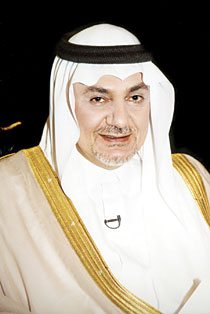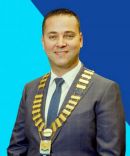| Middle East |
| Prince Turki accuses US government of doublespeak |
 |
Former Saudi Ambassador to Washington Prince Turki Al-Faisal asked American policymakers and their surrogates to cease sending disparaging messages that the Kingdom would be better with a change of regime. Speaking at the National Council on US-Arab Relations’ annual conference end of last month, he said Americans should stop saying it was inconsequential whether Osama Bin Laden is captured. He also said he was confused by what he saw as US policy “doublespeak” on some Prince Turki condemned Henry Kissinger, former secretary of state under President Richard Nixon, who, during the Republican Party’s National Convention in September, in responding to a question about the “From one who is considered the elder statesman of America ... (this is) not very statesmanlike. Is Dr. Kissinger calling for the overthrow of the Kingdom? And for what?” asked Prince Turki. He urged US policymakers to “discard such jingoistic propositions” and to resist using such terms as “them and us” when referring to Americans and oil-producing countries. “The United States should also stop deluding itself, if that is the case as Mr. Kissinger has described, that He then reminded the audience that Kissinger allegedly threatened the late King Faisal with an oil embargo in the 1970s, to which King Faisal is said to have replied: “If that is the case, we will go back to our tents in the desert and live on camel’s milk and dates. But you, Mr. Kissinger, what will you do if there is no more oil?” “This is probably an apocryphal account,” said Prince Turki, “but it is indicative of the Kingdom’s resolve to survive, regardless of what Mr. Kissinger believes or advocates.” Prince Turki then shifted his criticism to challenge current Secretary of State for Public Diplomacy and Public Affairs James Glassman for a speech he gave to correspondents last July at the Washington-based At this, Prince Turki paused, asking: “How true, Mr. Glassman. How about living up to those words and championing freedom for the Palestinians?” He quoted Glassman again: “In the war of ideas, our core task is not to fix foreigners’ perception of the Describing this statement as “extraordinary,” Prince Turki noted that Glassman explained that the He asked how the root cause that brings in recruits to Al-Qaeda is the view of “I cannot understand this doublespeak,” said Prince Turki. Condemning Glassman for saying it was not “particularly important” to capture Bin Laden, and saying whether Bin Laden is killed or captured “is not of great consequence,” Prince Turki noted this opposed President Bush’s pledge that “We will get Bin Laden.” “Every day that Bin Laden lives, after the president’s promise, he gathers more prestige and an aura of invincibility,” warned Prince Turki. “His image as the untouchable enemy of the greatest power on earth is the best recruiting means for him.” Prince Turki ended his speech saying he was “very much opposed” to a
|
- Sultanate of Oman celebrates its 38th National Day
- Kuwait’s Amir Sheikh Sabah warned against undermining national unity
- President Sleiman’s visit to King Abdallah reaffirming Riyadh’s support for the process of conciliation in Lebanon
- Development march under Sheikh Khalifa the UAE President
- Prince Alwaleed a man for all titles
- Lebanese President hails Kuwait's support to his country
- Al Attiyah addressed a seminar on Dialogue in Spain
- Thousands of Christians flee violence in Iraq
- H.H Sheikha Mozah addresses a UNESCO Conference in Paris
- UN meet opens new era of peace



















